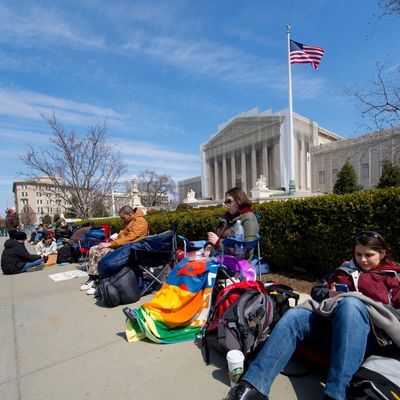
It all comes down to this: The Supreme Court will hear arguments starting today on two separate same-sex marriage cases, one involving California’s Proposition 8 and one on the federal Defense of Marriage Act (DOMA), and the rulings on each could go any number of complicated ways. The “unusually wide range of options” includes a historic decision for equality advocates that could make marriage a constitutional right for everyone or a narrow ruling that would leave the issue to the states, with multiple options in between. Below we’ve laid out the major characters, fun facts, key numbers, and potential conclusions of the year’s biggest cases. Get familiar.
The Schedule
Tuesday, March 26: Prop 8, Hollingsworth v. Perry, 60 minutes
Wednesday, March 27: DOMA, United States v. Windsor, 110 minutes
The Prop 8 Players
For about an hour, the Supreme Court will hear about Prop 8. According to the New York Times, Charles Cooper, a lawyer for the Prop 8 proponents, will have 30 minutes and “will probably get questions about his clients’ standing and the reasons offered to support the ban on same-sex marriage.” Because California Governor Jerry Brown and Attorney General Kamala Harris have declined to defend Prop 8, its conservative backers are doing it themselves. This is Dennis Hollingsworth, the case’s namesake defendant, of ProtectMarriage.com:
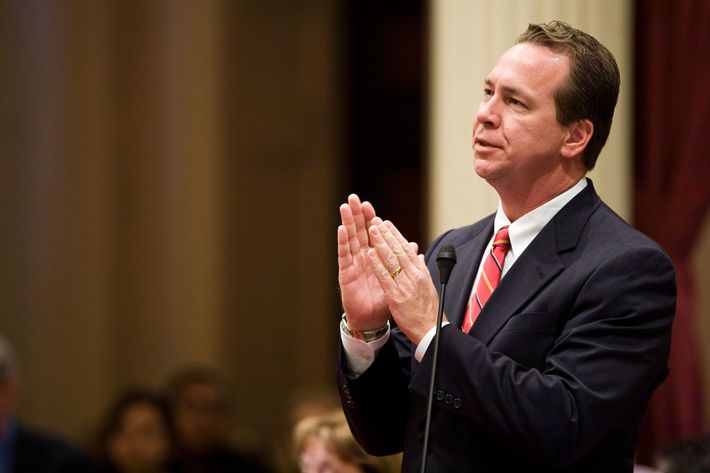
If the court rules that Hollingsworth’s team doesn’t have the standing to defend the amendment, the ruling reverts to an earlier decision which struck down Prop 8, but may only apply within the state, or even just to those who filed the initial suit, with the nationwide consequences still unknown.
The case is named on the other side for Kristin Perry, who was denied a marriage license in Berkeley. Here she is with her partner, Sandra Stier, with whom she has four children:
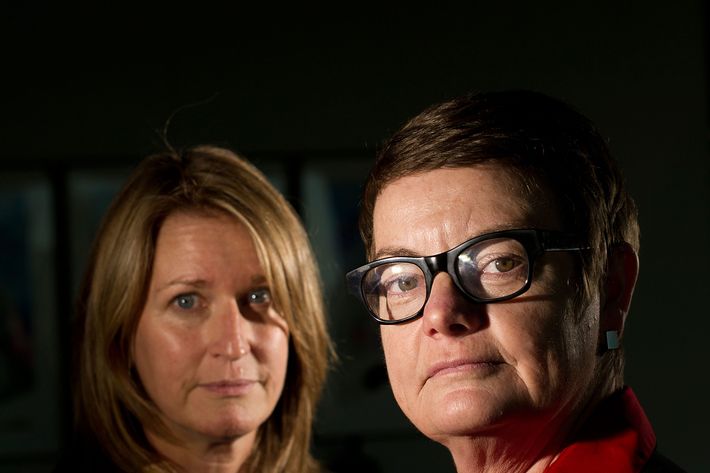
Arguing for Perry are the attorneys Theodore Olson and David Boies, who faced off in Bush v. Gore but are now both challenging the ban, and will have twenty minutes in court today. “[Olson, who will speak] will most likely be asked why the issue should be withdrawn from public debate and a fast-moving political process,” the Times notes.
Solicitor General Donald Verrilli Jr. will then have ten minutes and will explain why the Obama administration believes Prop 8 should be struck down. The government will argue on grounds referred to as the “eight-state solution,” which would apply only to states where gay marriage is banned, but same-sex civil unions are allowed (California, Delaware, Hawaii, Illinois, Nevada, New Jersey, Oregon, and Rhode Island). Verrilli will argue that this violates the equal-protection clause of the Constitution. That case has been called “quite modest,” while others have argued, “If the Court takes the President’s argument seriously, the justices need not stop at just 8 states. The President’s theory could invalidate all marriage discrimination against gays.”
The Main Prop 8 Arguments
Should the pro–Prop 8 side be found to have standing, they will argue that “traditional” marriage should be preserved so that children “will be born and raised in stable and enduring family units by their own mothers and fathers.” SCOTUS Blog’s “In Plain English” column explains why that’s an interesting tactic:
The challengers dispute the notion that same-sex couples shouldn’t be allowed to marry because they can’t have children. That theory would, they say, also extend to opposite-sex couples who either can’t or don’t want to have children of their own. (As Mark Sherman of the Associated Press has pointed out, this is an argument that could resonate with some of the current Justices: neither Justice Thomas and his wife nor the Chief Justice and his wife have biological children together, while Justice Sotomayor – who is now divorced – has said that when she married she did not intend to have children because of her diabetes.)
The other side, Olson and Boies, are putting most of their focus on arguing that “marriage is a fundamental right that has nothing to do with having children. … Because marriage is such a fundamental right, and gays and lesbians have traditionally been victims of discrimination, the challengers continue, the Court should apply a more demanding test – known as ‘heightened scrutiny’ – to determine whether Proposition 8 is constitutional.” If the court agrees, all bans on gay marriage could be in trouble constitutionally.
Or …
Since California couples were once given the right to marry for a few months in 2008, the court could opt for a very narrow ruling that once a state grants a right, it can’t take it back. While such a ruling would only affect California, “That’s an unlikely basis for the U.S. Supreme court to rule on because it would discourage states from experimenting with equality,” says Amar.
It’s also important to point out, as the Times does, “There is no possibility that the court would ban same-sex marriage in places that choose to permit it.” So that’s good.
And DOMA?
“If the court is to establish a constitutional right to same-sex marriage, it will be in [the Prop 8 case] and not in a narrower one to be argued on Wednesday about the federal Defense of Marriage Act,” according to the Times. Still, the 1996 federal law applies to more than 1,000 benefits that married couples have, and potentially violates the equal-protection clause of the Fourteenth Amendment. Here’s Edith Windsor, the face of the DOMA case, who was forced to pay $363,053 in estate taxes after her partner of more than 40 years died (and see more of her riveting life here):
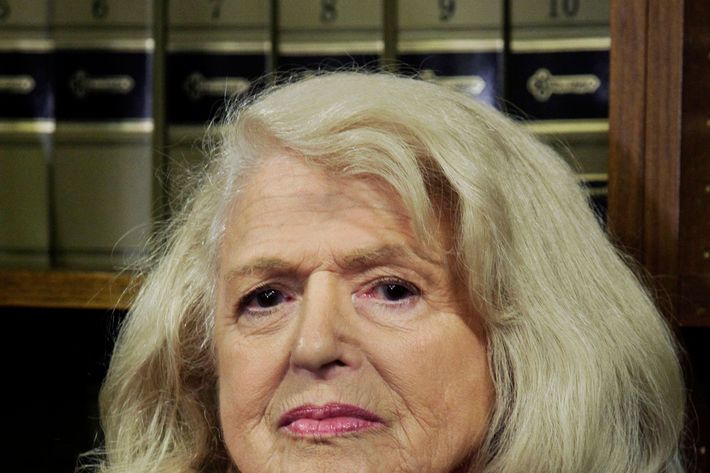
DOMA, too, faces questions of standing because the Obama administration has declined to defend it, leaving it to Republicans in the House to step up. But even if the court strikes the law down, “the Court could write the decision narrowly, opening federal benefits to married gay couples but not broadly addressing the question of marriage as a fundamental right.”
Who Decides?
Most Supreme Court watchers agree that Justice Anthony Kennedy is key, pointing to the reliably conservative justice’s writings upholding gay rights in two other major cases. “But he is notoriously hard to read,” says the Times, and he has argued in the past, “A democracy should not be dependent for its major decisions on what nine unelected people from a narrow legal background have to say.”
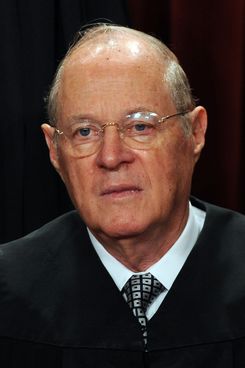
“What we may see is a decision here that in essence is not a 5-4 decision, but a 6-3, 7-2 that says ‘leave it up to the states.’ In fact, we could see an 8-1,” said Karl Rove on TV over the weekend, thus practically assuring that will never happen.”
“One of the great sins of Roe versus Wade, the abortion decision of 40 years ago, was that it decided everyone has to do it one way, instead of leaving it to the states,” agreed Peggy Noonan, another notoriously bad predictor. “May I note, by the way, Ruth Bader Ginsburg, a famous court liberal, her acknowledging very recently was in I think the Times today, that the Roe versus Wade decision, the abortion decision, had gone too far and was an overreach. That is an epic statement from an American liberal left jurist,” she continued, although that interpretation is vastly oversimplified.
Supreme Court expert Jeffrey Toobin, who recently profiled Ginsburg for The New Yorker, said she will probably find DOMA unconstitutional, but might keep her ruling narrow. “She does not believe in grand pronouncements, even liberal grand pronouncements, from the Supreme Court,” he said.
Douglas Kmiec, a legal scholar writing at the Huffington Post, predicts both DOMA and Prop 8 will fall. “Because of its irrational allocation of federal benefits, it is widely speculated that the Court will invalidate DOMA,” he writes. “The fate of Prop 8 is closer to call depending upon whether Justice Kennedy acts yet again as the swing vote joining the more progressive Justices Ginsburg, Breyer, Sotomayor and Kagan to invalidate the law.” But he also lays out the possibility of Chief Justice Roberts siding with opponents of Prop 8 after his surprise ruling on health care:
If the Chief Justice does join Justice Kennedy and the more liberal members of the bench, he will be achieving consensus in these days of incessant division over far more prosaic budget questions. Indeed, by his own actions, the Chief Justice is meeting institutional objectives he defined for the Court from the beginning of his service. With the exception of Justice Scalia, all sides of the political spectrum are singing his praises.
Toobin, writing at The New Yorker, lays out the historical importance of the cases, which a justice like Roberts might not wish to be on the wrong side of: “At this point, not even the Supreme Court can reverse the march toward equality,” he writes. “The question about marriage equality for all Americans is not if it will pass but when. The country has changed, and it’s never going back to the way it was. Though the battles continue, the war is over.”
When will we know?
Well, the guessing will start tomorrow because transcripts and audio of the day’s arguments will be released online, but it’s worth remembering that after Obamacare arguments, experts thought the law was doomed. Final decisions are expected in June.





























